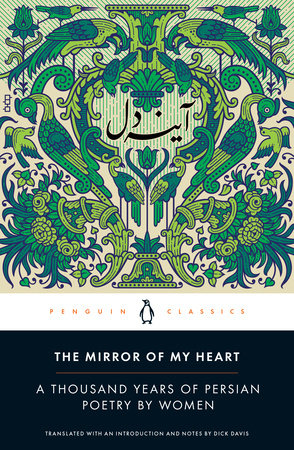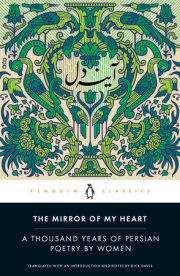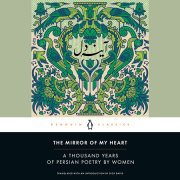Rabe'eh
Tenth century
Rabe'eh's family claimed descent from Arabs who had entered Iran during or after the seventh-century conquest of the country. By the time Rabe'eh was born, her father had become ruler of Balkh in what is now northern Afghanistan. Almost no information about her life has come down to us, although the lurid story of her demise is well known: after her father died she is said to have carried on a secret love-affair with a slave or servant at what was now the court of her brother, Hareth. The liaison was discovered, and Hareth cut her throat and left her in a bath-house where she bled to death; her lover then killed Hareth and committed suicide.
*
The garden shows so many flowers, as though
Mani had painted their resplendent glow
Dawn's breezes never bore Tibetan musk,
How is the world so musky when they blow?
Are Majnun's eyes within the clouds, that they
Shed Layli's cheeks' hue on each rose below?
Like wine within an agate glass, his tears
Have filled each tulip with their crimson glow
Raise up the wine bowl, raise it generously
Since bad luck dogs deniers who say "No"
Narcissi glow with silver and with gold
It's Kasra's crown their shining petals show
Like nuns in purple cowls the violets bloom
Do they turn into Christians as they grow?
*
My hope's that God will make you fall in love
With someone cold and callous just like you
And that you'll realize my true value when
You're twisting in the torments I've been through.
*
His love has caught me once again-
I've struggled fiercely, but in vain.
(Well, sobersides, explain to me
Just who can swim love's shoreless sea!
To reach love's goal you must accept
All you instinctively reject-
See ugliness as beauty, eat
Foul poison up and call it sweet.)
I jerked my head to work it loose,
Not knowing all this would produce
Was further tightenings of the noose.
*
I'm drunk with love to know my love is here tonight
And that I'm freed from sorrow and from fear tonight;
I sit beside my love, and earnestly I say,
"God, make the key to morning disappear tonight!"
Mahsati
c.1089-1159
Mahsati was said to be from Ganjeh, in what is now independent Azerbaijan, and to have sought employment as a scribe at the court of the Seljuk king Sanjar, who ruled from 1118 to 1157. She became known as the writer of a considerable number of short poems, and it is likely that many otherwise anonymous poems from the medieval period that seemed to be by women became attributed to her.
*
As wounded, and caught in your snare-there's no one like me
As driven by you to despair-there's no one like me
So many, so eagerly, vie for your love . . .
As steadfastly faithful I swear-there's no one like me.
*
If you're a hypocrite, and bow your face in prayer-what use is that?
Once poison's reached into your soul, remedial care-what use is that?
Showing yourself to everyone as though you're virtuous and moral,
If you're all filth within, the spotless cloak you wear-what use is that?
*
Love makes a lion cower in its lair-
It is a sea of wonders, strange and rare;
At times its kindly ways delight our souls
At times the smell of blood is in the air.
*
O son of Ganjeh's preacher, my advice to you
Is: "Take the wine glass in your hand, give joy its due . . ."
Your piety and heresy don't interest God-
Seek pleasure in this world now, while you're able to.
*
Come, I've prepared a private room where we can meet,
With precious cloths laid there, to make a snug retreat;
I've grilled kebabs and wine I want to share with you-
The wine is from my eyes, my anguished heart's the meat.
*
I wish I were a shining thumb-ring,
Such as our archers wear!
Each time he came to shoot an arrow
He'd lean to me with care,
And as the bow-string reached his teeth,
I'd steal such kisses there!
*
You think you'd like to sleep with me?
That's an impossibility!
No dream of yours could bring about
This idiotic fantasy;
What makes you think you might? Even
The winds of heaven can't get to me.
*
Great king, the heavens have saddled Glory for you-
More than all other monarchs, they adore you!
To keep your horse's golden horseshoes spotless
They've spread a silver carpet out before you.
*
I said, "Quick, bring some wine." He said, "Look here,
It's Friday's eve; shouldn't you sleep, my dear?"
I said, "Each week there'll be another Friday-
The roses bloom for us but once a year . . ."
*
Those nights when I so sweetly slept with you-they've gone.
Those pearl-like tears my lashes wept with you-they've gone.
You were my heart's peace and my soul's dear friend-you went,
And all the promises I kept with you-they've gone.
*
I knew your promises were feeble-hearted,
I knew you'd break them, long before we parted;
And all the nasty things you did at last-
My friend, I had foreseen them when we started.
*
We're drunkards, ne'er-do-wells, but kind and civil-
We're not the men for prayers and all that drivel.
Our judge thinks wine's a sin; we're petty thieves,
He filches orphans' wealth . . . so who's more evil?
*
The judge's wife was pregnant, he was furious,
"I'm old," he cried, "and this is more than curious!
That whore's no Virgin Mary, and my prick can't stir-
So whose child is it then that's grown so big in her?"
*
I'm drunk, and drunkards are the crowd I follow-
Ascetics' claims I find absurd and hollow;
I love that moment when the server says,
"One more . . .?" and one more's more than I can swallow.
*
That handsome cobbler when he sews a shoe
Kisses the leather as he bites his thread-
A shoe that's kissed by such sweet ruby lips
Deserves to crown the sun-in-heaven's head.
*
It seems, my boy, you went out drinking wine last night
And thought that kissing someone else would be all right,
But in response, or so I hear, she scratched your face-
When do I get to see what must be quite a sight?
*
An old man says we must remain here-
we can't be kept locked up
In this sad chamber, wracked with pain here,
we can't be kept locked up
That woman whose tempestuous hair
is like a wild beast's mane,
Stuck in the house, held by a chain here,
she can't be kept locked up
*
Go, tell the bath-house owner that he needn't keep
His fire alight tonight, that he can go and sleep,
And in the morning I'll be there-my burning heart
Will be the fire, the water all the tears I'll weep.
*
I saw, dead drunk and stretched out in the lane, a man I know-
I lent a hand and helped him to his feet, and watched him go;
Today it seems he can't remember this, and looks as though
He means to say, "Do I know you?" It happened, even so.
*
His face is envied by both jessamine and rose,
His flirting charms both sexes everywhere he goes-
Lissome as flowing water, I saw him walking once . . .
And still within my eyes that gentle water flows.
*
I wish I had the heart
to write a letter and complain;
I wish I had the soul
to find the right words for my pain-
I'm so distracted, crazed
with wretchedness, I pick my pen
And paper up . . . and start to cry . . .
and throw them down again.
*
Dear, dry your pointless tears, tears don't suit you-
I'm sad enough, you needn't be sad too;
Look, you're the loved one, crying's not your role-
Let me do what the lover has to do!
*
You're no great intellect, and men like you don't know
The usual kindnesses a lover ought to show-
My flighty friend, I'm glad I'm with you here tonight,
I hope I don't regret it in the morning though . . .
*
Although we don't get on in any way
I'll be polite to you still, come what may.
"What have I done?" you ask. Just tell me what
You haven't done! My dear, what can I say?
*
The one your beauty's overthrown
has come back home;
The one who thirsts for you alone
has come back home;
Prepare the cage again, scatter your seeds
of kindness there-
Look, broken-winged, the bird you own
has come back home.
*
A rose that's celebrated everywhere-that's something
A youngster's shirt disfigured by a tear-that's something
Sweating profusely, crimson-faced, confused with shame
A mouth that's stuffed with golden coins, I swear-that's something
Anonymous
Twelfth century or earlier
Nothing is known about this poet, though her poem indicates that she was probably a female musician/entertainer.
*
Brought to this town's bazaar today, I'll be
The best "companion" here-so who will hire me?
Though I don't care for those who want to have me,
And those I like the look of don't desire me.
Motrebeh
Twelfth century
Motrebeh is a description of her profession, as it means "a female musician," rather than her actual name, which is unknown. She was a member of the household of Toghan Shah, the ruler of Nayshapur, who died in 1185 or 1186.
*
I said, "My heart would like a kiss from you."
"A kiss from me will cost your soul," he said.
Immediately my heart poked at my side
And whispered, "That's dirt cheap dear, go ahead!"
Daughter of Salar
Early thirteenth century
Referred to as bint Esfahanieh ("the woman from Esfahan"), the poet's given name is unknown. She became famous for a now lost panegyric she wrote to the Seljuk soltan Kay Kavus I, who ruled in Asia Minor in the first quarter of the thirteenth century, and this gives us the approximate period in which she lived. Her panegyric received this encomium: "The daughter of Hesamaddin Salar sent to his Majesty from Mosul this panegyric, which outdoes the gentle breeze of spring in its graciousness and the waters of Paradise in its flowing limpidity. His majesty gave instructions that she was to be paid a hundred dinars of red gold for every line. As there were 72 lines, 7,200 dinars were dispatched to Mosul . . ."
*
The more I search myself the more I see
That longing for your love has ruined me;
I gaze into the mirror of my heart,
And though it's me who looks, it's you I see.
Aysheh Samarqandi
Thirteenth century
This poet's name is also given as Aysheh Moqrieh, "Moqrieh" meaning "a female singer." Apart for the fact that she was from Samarqand and lived as a singer, nothing further is known about her.
*
I said, "Bright moon, give my heart back to me-
How long must I endure love's agony?"
He spread a thousand hearts before my eyes
And said, "Take yours; which is it? You tell me."
Copyright © 2021 by Dick Davis. All rights reserved. No part of this excerpt may be reproduced or reprinted without permission in writing from the publisher.






